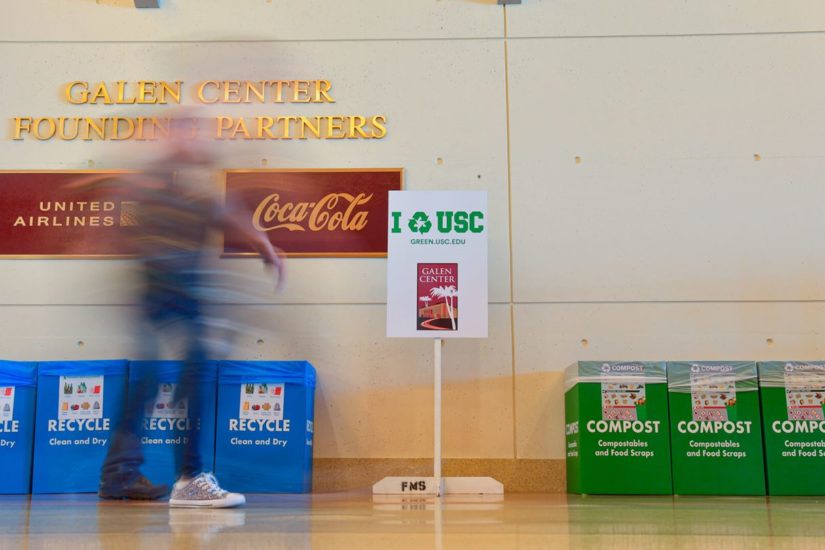
Zero Waste Game at USC Trojans Basketball game
USC Athletics commits to support United Nations sports for climate action initiative
USC Athletics joined the UN Sports for Climate Action initiative, pacing the university’s rapidly expanding sustainability efforts.
USC Athletics will join the U.N. Sports for Climate Action initiative, pacing the university’s rapidly expanding sustainability efforts.
It is the fifth U.S. collegiate athletic department to commit to the U.N. framework, which spells out measures needed to slow global warming, leverage fans and sponsors and protect the health and safety of athletes. Other universities include the University of Colorado, Boulder, Ohio State University, University of Miami and Wake Forest University.
“In alignment with USC’s bold vision for sustainability, we are thrilled to become the fifth collegiate athletic department to join this important initiative,” said USC Director of Athletics Mike Bohn. “We support the plan outlined in the Sports for Climate Action framework, and we commit to working collaboratively with our peers and relevant stakeholders to drive climate action and awareness through sports.”
USC also joins other participating sports organizations worldwide, including the International Olympic Committee, NBA, NFL, International Federation of Association Football (FIFA), United States Golf Association, Wimbledon tennis and Formula 1 racing. Specific franchises include the New York Yankees and Mets, Los Angeles Kings, Los Angeles Galaxy, Los Angeles Football Club and Golden State Warriors, among more than 200 others.
The Sports for Climate Action initiative is part of the U.N. Framework Convention on Climate Change (UNFCCC). The program commits the global sports community to combat climate change through commitments and partnerships according to verified standards, including measuring, reducing, and reporting greenhouse gas emissions. Most of the world’s countries endorse the goal of the UNFCCC to stabilize greenhouse gas concentrations “at a level that would prevent dangerous anthropogenic (human-induced) interference with the climate system.”
Specifically, five principles guide the effort:
- Undertake systematic efforts to promote greater environmental responsibility;
- Reduce overall climate impact;
- Educate for climate action;
- Promote sustainable and responsible consumption;
- Advocate for climate action through communication.
USC’s commitment to the U.N. framework, approved March 10, expands the sustainability leadership role staked by USC Athletics. In recent years, USC Athletics has hosted zero-waste football and basketball games at the Coliseum and Galen Center. This season’s Sept. 25 home football game against Oregon State University is designated as the university’s flagship green game. Also, USC has twice won the Pac-12 zero-waste competition in football (2017 and 2018).
Last year, 1,500 solar energy modules were installed on the Galen Center roof to supply about 15% of the arena’s electricity, making it the biggest solar power project at USC. Additionally, more than 3,000 LED light bulbs were put into the arena and a “pony chiller,” which is a small, efficient motor, was added to its cooling units; the energy conservation measures help reduce USC’s greenhouse gas emissions.
“Athletics is one of USC’s biggest — and earliest — sustainability champions,” said Ellen Dux, associate director of the USC Office of Sustainability. “Participation in the U.N. Sports for Climate Action framework, plus the many other actions already undertaken by the athletics program, demonstrates our commitment to address climate change as we integrate sustainability principles into daily operations.”
Sustainability has been a priority since USC President Carol L. Folt arrived in late 2019. Among USC Sustainability’s goals are the elimination of single-use plastics, a reduction of greenhouse gases, expansion of waste diversion and more charging stations for electric vehicles.
This year, the university is participating for the first time in the national Sustainability Tracking, Assessment and Ratings System that measures, monitors and manages USC’s environmental progress. That methodology and reporting system complements the U.N. Sports for Climate Action program.

